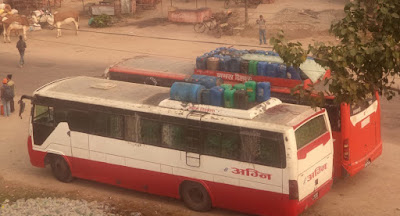Nepal stunned Test giants New Zealand by 32 runs in their opening
match of the ICC U-19 World Cup in Bangladesh to regain their status as giant
killers in the youth cricket’s global showpiece.
Invited to make the first use of the
pitch, Nepal made 238-7 in 50 overs and bowled New Zealand out for 206 in 47.1
overs. Nepal captain Raju Rijal led from the front with a composed 65-ball 48
and put on 61 runs for the fifth wicket with Aarif Sheikh.
It was Nepal’s second win over New Zealand
and seventh overall against a Test playing nation. Nepal had defeated the
junior Black Caps by one wicket to win the Plate Championship final in 2006. It
was Nepal’s first victory over a Test playing nation since they humbled
Zimbabwe by 99 runs in the 2008 Plate quarter-finals.
Once given a moniker of ‘giant killers’ in
the wake of a string of stunning results against big guns like South African
(twice), Pakistan, Bangladesh and Zimbabwe, off late Nepal have been struggling
even to qualify for the World Cup. They had missed out on the 2010 edition and
finished 13th in 2012 before failing to qualify for the 2014 event.
While Afghanistan, Fiji, Canada, Namibia
and Scotland made it to the finals as champions among non-Test playing teams
from their respective regions, Nepal needed to win the Global Qualifiers to
secure the last available berth in the 16-team event in Bangladesh. But with
Thursday’s win, Nepal have not only reclaimed the ‘giant killers’ tag but also
opened a chance to enter the second round. Nepal will play Ireland in their
next game in Group D which also features three-times U-19 champions India.
Current Nepal national team skipper Paras
Khadka, who was part of the team that defeated New Zealand in 2006 Plate Final,
was as excited as the rest of the country by Nepali colts’ latest exploit.
“We are back with what we were known for
in U-19 cricket. It proves we have inherent cricketing talent which can do
wonders provided there are exposures and opportunities,” said Khadka.
“It’s an amazing feeling to beat a Test
nation because we cannot be compared with them in terms of infrastructure and
resources. The boys have given a massive start to the tournament but there is
still a long way to go,” he added.

























